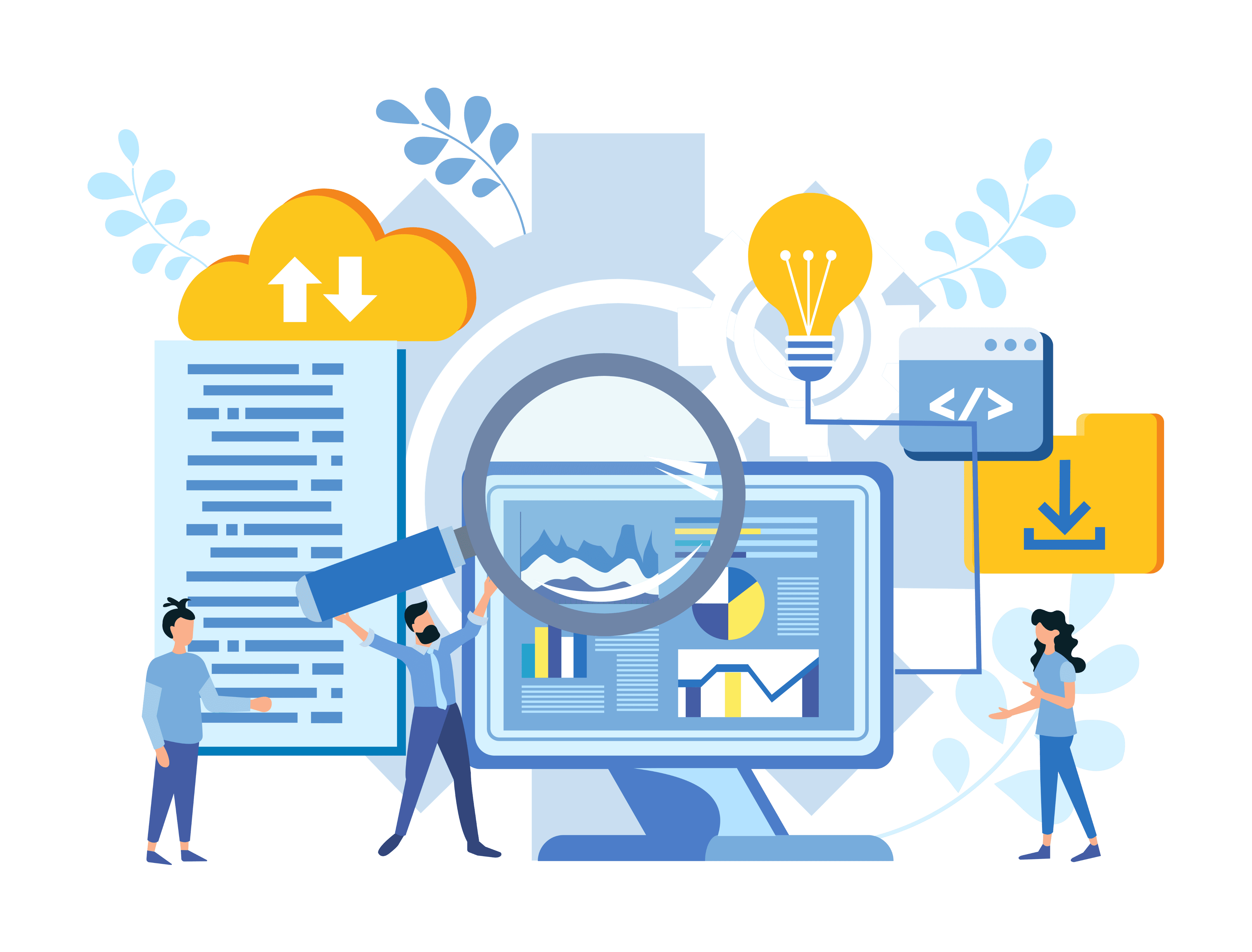ERP for Business: What is it and What Are the Benefits?

ERP for Business
In today’s rapidly evolving business landscape, organizations face numerous challenges, such as increasing competition, complex operations, and the need for real-time decision-making. To address these issues, many businesses turn to Enterprise Resource Planning (ERP) systems. ERP software integrates various business processes into a centralized system, providing a wide range of benefits for companies of all sizes. In this blog post, we will explore what ERP is, how it works, and the benefits it offers to businesses.
What is ERP?
Enterprise Resource Planning (ERP) refers to a suite of integrated software applications that streamline and automate core business processes. These processes may include finance, human resources, supply chain management, customer relationship management, inventory management, and more. The ERP system consolidates data from different departments into a single database, ensuring data consistency, accuracy, and accessibility across the organization.
How Does ERP Works?
ERP systems typically consist of modules that focus on specific business functions. Each module collects and stores data related to its respective area. For example, the finance module manages financial transactions, budgeting, and reporting, while the supply chain module handles procurement, inventory, and logistics. The integration of these modules allows information to flow seamlessly between departments, enabling better collaboration and decision-making.
Benefits of ERP for Businesses:
Improved Efficiency and Productivity: By automating manual processes and eliminating redundant tasks, ERP systems enhance operational efficiency and increase productivity. Employees can spend less time on administrative tasks and more time on value-added activities, leading to improved overall performance.
Enhanced Data Accuracy and Decision-Making: ERP systems provide a single source of truth by consolidating data from various departments. This ensures data accuracy, eliminates data duplication, and reduces errors. With real-time access to reliable data, businesses can make informed decisions quickly and effectively.
Streamlined Business Processes: ERP systems streamline and standardize business processes across departments. This leads to improved coordination, reduced delays, and better resource utilization. For instance, a sales order can trigger automated processes in inventory management, production, and finance, ensuring a smooth flow of operations.
Increased Visibility and Reporting: ERP software offers comprehensive reporting and analytics capabilities. Businesses can generate custom reports, track key performance indicators (KPIs), and gain insights into various aspects of their operations. This visibility enables proactive monitoring, facilitates data-driven decision-making, and helps identify opportunities for improvement.
Enhanced Customer Relationship Management (CRM): Integrating CRM functionality within an ERP system enables businesses to manage customer interactions, sales pipelines, and marketing campaigns effectively. By having a holistic view of customer data, organizations can deliver personalized experiences, improve customer satisfaction, and drive customer retention.
Scalability and Flexibility: ERP systems are designed to adapt to the evolving needs of businesses. As companies grow or diversify their operations, ERP software can accommodate increased data volumes, additional users, and new functionalities. This scalability and flexibility ensure that the ERP system remains a valuable asset in the long term.
Implementing an ERP system can transform how businesses operate and drive sustainable growth. From streamlining processes to offering accurate data insights, ERP provides numerous benefits for organizations across various industries. By centralizing information, automating tasks, and facilitating collaboration, ERP software empowers businesses to stay competitive in today’s dynamic business environment. Embracing ERP can be a strategic move that unlocks new efficiencies, improves decision-making, and helps achieve business goals.

ERP for Business: What is it and What Are the Benefits?
ERP for Business
In today’s rapidly evolving business landscape, organizations face numerous challenges, such as increasing competition, complex operations, and the need for real-time decision-making. To address these issues, many businesses turn to Enterprise Resource Planning (ERP) systems. ERP software integrates various business processes into a centralized system, providing a wide range of benefits for companies of all sizes. In this blog post, we will explore what ERP is, how it works, and the benefits it offers to businesses.

What is ERP?
Enterprise Resource Planning (ERP) refers to a suite of integrated software applications that streamline and automate core business processes. These processes may include finance, human resources, supply chain management, customer relationship management, inventory management, and more. The ERP system consolidates data from different departments into a single database, ensuring data consistency, accuracy, and accessibility across the organization.
How Does ERP Work?
ERP systems typically consist of modules that focus on specific business functions. Each module collects and stores data related to its respective area. For example, the finance module manages financial transactions, budgeting, and reporting, while the supply chain module handles procurement, inventory, and logistics. The integration of these modules allows information to flow seamlessly between departments, enabling better collaboration and decision-making.
Benefits of ERP for Businesses
Improved Efficiency and Productivity: By automating manual processes and eliminating redundant tasks, ERP systems enhance operational efficiency and increase productivity. Employees can spend less time on administrative tasks and more time on value-added activities, leading to improved overall performance.
Enhanced Data Accuracy and Decision-Making: ERP systems provide a single source of truth by consolidating data from various departments. This ensures data accuracy, eliminates data duplication, and reduces errors. With real-time access to reliable data, businesses can make informed decisions quickly and effectively.
Streamlined Business Processes: ERP systems streamline and standardize business processes across departments. This leads to improved coordination, reduced delays, and better resource utilization. For instance, a sales order can trigger automated processes in inventory management, production, and finance, ensuring a smooth flow of operations.
Increased Visibility and Reporting: ERP software offers comprehensive reporting and analytics capabilities. Businesses can generate custom reports, track key performance indicators (KPIs), and gain insights into various aspects of their operations. This visibility enables proactive monitoring, facilitates data-driven decision-making, and helps identify opportunities for improvement.
Enhanced Customer Relationship Management (CRM): Integrating CRM functionality within an ERP system enables businesses to manage customer interactions, sales pipelines, and marketing campaigns effectively. By having a holistic view of customer data, organizations can deliver personalized experiences, improve customer satisfaction, and drive customer retention.
Scalability and Flexibility: ERP systems are designed to adapt to the evolving needs of businesses. As companies grow or diversify their operations, ERP software can accommodate increased data volumes, additional users, and new functionalities. This scalability and flexibility ensure that the ERP system remains a valuable asset in the long term.

Implementing an ERP system can transform how businesses operate and drive sustainable growth. From streamlining processes to providing accurate data insights, ERP offers numerous benefits for organizations across various industries. By centralizing information, automating tasks, and facilitating collaboration, ERP software empowers businesses to stay competitive in today’s dynamic business environment. Embracing ERP can be a strategic move that unlocks new efficiencies, improves decision-making, and helps achieve business goals.
Related Blogs

Empower Manufacturing With ERP
ERP software can help empower manufacturing by automating processes, streamlining workflows, and increasing efficiency.

What is Enterprise Resource Planning | How does ERP Software Work | Available ERP Software
ERP is a critical piece of business software. It can help you manage your finances, track employees, and more.

Top 10 ERP Software for Automating Business Requirement
ERP software is a type of software that helps manage and track business requirements.

Why ERP Software is Important For Your Business
ERP software is essential for any business! It can assist you in managing your money, tracking staff performance, and much more.
Related Blogs

Empower Manufacturing With ERP
ERP software can help empower manufacturing by automating processes, streamlining workflows, and increasing efficiency.

What is Enterprise Resource Planning | How does ERP Software Work | Available ERP Software
ERP is a critical piece of business software. It can help you manage your finances, track employees, and more.

Top 10 ERP Software for Automating Business Requirement
ERP software is a type of software that helps manage and track business requirements.

Why ERP Software is Important For Your Business
ERP software is essential for any business! It can assist you in managing your money, tracking staff performance, and much more.
